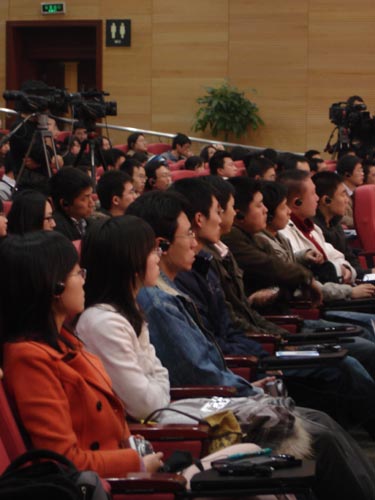By Wu Huanshu
On November 12 2008, the second day of "Nobel laureates Beijing forum 2008", two Nobel winners - Zhores I Alferow and David Gross, and two Turing Award winners - John E Hopcroft and Robert Kahn, had a panel discussion with a group of university students at Tsinghua Technology Park conference center in Beijing.
During the discussion, the Nobel laureates shared stories about their careers and lives with university students, and also gave them many suggestions.

|
|
On November 12 2008, the second day of "Nobel laureates Beijing forum 2008", two Nobel winners - Zhores I Alferow and David Gross, and two Turing Award winners - John E Hopcroft and Robert Kahn, had a panel discussion with a group of university students at Tsinghua Technology Park conference center in Beijing.[Wu huanshu/China.org.cn]
|
The most important things in life
Nobel laureates believed no matter whether you are a good student or not, and no matter how far you are from your dreams, you should know what are the most important things in your life.
Zhores I Alferow, Nobel Prize winner in 2000, explained that he decided to be a scientist because when he was young his older brother constantly explained things to him, especially in science. "The most important thing in life is your inspiration. And I believe that from the very beginning your inspiration is influenced by your family," he said.
"Do what you love -- follow whatever your mind persuades you is the most important thing," said David Gross, Nobel Prize winner in physics in 2004. He asked university students to try their best to achieve their dreams. "Don't do only those things that can make money for you, and don't set prizewinning as your goal. When you love something, you will be interested in it, and then you can reach your dream."
1986's Turing Award winner John E Hopcroft believed that if university students target the future rather than living in the past, they will discover more opportunities. "Today we are moving into an information age which is going to affect probably every branch of science, and this will provide opportunities to explore new areas. So I would encourage you to love your future and give yourself a program for success" was his message to the university students.
Another Turing Award winner in 2004, Robert Kahn, highlighted self-belief and conviction in your choices as the most important criteria for success. "When your instinct tells you your choice is right, just stick to that no matter how many people say it is wrong. I think believing in yourself is very important," he said.

|
|
University students listen to the Nobel laureates' lectures at Tsinghua Technology Park conference center in Beijing.[Wu huanshu/China.org.cn]
|
Interest was the incentive to become a scientist
Not only did the discussion give the opportunity to hear the laureates' stories, it also offered university students the chance to ask questions of their idols. When a student from Beijing International Students University asked the 4 laureates why they chose science as career, because sometimes it seemed a little bit boring, the 4 laureates gave the same answer -- interest.
Mr. Gross said curiosity was the first instinct that drove him to become a scientist. When he succeeded in discovering or explaining something, it would make him very happy, because it might contribute something worthwhile to the world. "Science has a miraculous power to improve the lives of large numbers of people - this is what makes me happy and this is the reason why I became a scientist" he said.
"Choosing science as my career was a very meaningful thing for me," said Robert Kahn. "If you are genuinely interested in something, you will find it is significant to you. For me, research is a kind of relaxation, and certainly not a boring task."
The university students would certainly have loved an even longer panel discussion with the Nobel laureates, but it was very helpful to them in improving their understanding of science and encouraging them to orient themselves soundly. A Tsinghua University student said he felt much closer to science in the presence of the Nobel laureates, and the discussion had greatly inspired him.
(China.org.cn November 13, 2008)